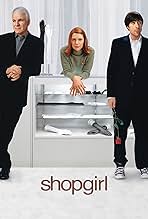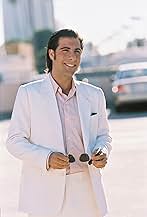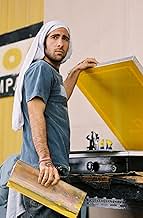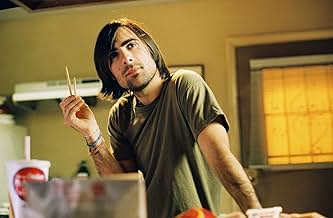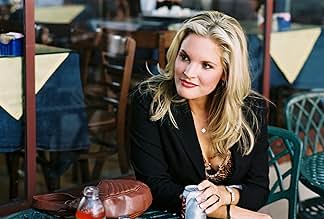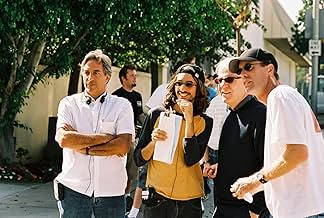अपनी भाषा में प्लॉट जोड़ेंA film adaptation of Steve Martin's novel about a complex love triangle between a bored salesgirl, a wealthy businessman and an aimless young man.A film adaptation of Steve Martin's novel about a complex love triangle between a bored salesgirl, a wealthy businessman and an aimless young man.A film adaptation of Steve Martin's novel about a complex love triangle between a bored salesgirl, a wealthy businessman and an aimless young man.
- पुरस्कार
- 1 जीत और कुल 7 नामांकन
- Hot Tears Band Member
- (as Johnny Fedevich)
फ़ीचर्ड समीक्षाएं
Sure, Ray is playing out a fantasy that is kind of creepy, but there are women looking for that kind of relationship, just listen to Dr. Laura. And men too, of course. Plus, the voice over sets this up as it basically says she is looking for love to "find her" and Ray does, so this is built into the premise like it or not. Over the course of the movie she matures beyond her fantasy, and I would like to think Ray does as well, although that isn't as clear.
The relationship between Ray and Mirabelle is, of course, a transaction. Ray is what used to be called a sugar daddy. He knows it, and within the limits of that role he is apparently a generous and considerate keeper. We aren't given Ray's back story, but it is not hard to guess that a symbolic logician who made a fortune in computers might have been socially challenged, to put it mildly, as a young man, and suffered a good deal of rejection from women. He can now buy what he couldn't then woo, but experience has taught him never to relinquish control and never to let himself be vulnerable. A few hundred million dollars have cleaned up his exterior nicely and given him power over his surroundings, but the inner nerd is still there.
Mirabelle certainly appreciates the value of what Ray can do for her. Consider the shot in Vermont where she gazes at her dried out, prematurely worn mother and decides she'll meet Ray in New York after all. But Mirabelle refuses to admit to herself that she is only being kept. We are meant to think the better of her for her self deception. The sluttish, annoying and frankly mercenary but cheerfully self aware Lisa is there to draw an unfavorable contrast with Mirabelle. Paradoxically, it is Mirabelle's self-deceived integrity, and her refusal to use the crude manipulations Lisa suggests, that make her a more exquisite ornament for Ray -- gourmet arm candy for a man with the finest taste. Both women are punished for self deception, but Lisa suffers only comic humiliation while Mirabelle sets herself up for real pain.
Jeremy has the makings of a Ray in him, but we are meant to believe that he has -- implausibly -- attained emotional enlightenment, if not the capacity for articulate speech or sustained rational thought. He has earned Mirabelle, we are told, because he has remade himself to be worthy of her. Love may not conquer all in this bittersweet anti-romance, but it still does better than break even.
The look and sound of the film are half of its appeal, from Peter Suschitzky's dreamy cinematography, to the production and art design that has each character in their own color scheme, to the enthralling score by Barrington Pheloung, though the atmospherics almost overwhelm the three characters who frequently seem like pieces in a set design as the camera slowly glides back to reveal an entire mise en scene.
Claire Danes is radiant and holds our eye and sympathy throughout the film, as we see life mostly from her first naive than wiser perspective, though she is portrayed as just about the last sweet young woman in the country, as all the other women seem pretty cold-blooded. While she has an underlying problem common to such in TV and movies these days, it is handled surprisingly visually and tenderly.
Over fourteen months, she encounters a bumbling young suitor, the adorably scruffy Jason Schwartzman, who even as his character matures retains endearing enthusiasm and quirks, and a sugar daddy in a somewhat mysterious Steve Martin, who is more believable than "Sex and the City"s similar "Mr Big." Ironically, the few physical comedy scenes are with Schwartzman, not Martin-- and that's a very funny scene about a condom, as this film in its quiet way is pretty frank about sex.
An occasional voice-over narration is obtrusive and unnecessary, even as Martin's adaptation of his novella claims the need for an omniscient observer, but the camera and the characters' body language visually communicate the same information. The sudden insertion of a parallel scene where two main characters suddenly explain themselves to listeners who we didn't know previously existed in their lives is a bit too convenient and doesn't really fit.
But the film is on the whole winning, as each character very gradually learns about who they are and who they can be, about the meaning of life, love, success and human connections, and about the clear-eyed choices they can make to attain these, to change or not. While the bulk of the film is set in Los Angeles, it feels like a picaresque journey of discovery as they go from one scene to another.
The song selections are marvelous, particularly Mark Kozelek's varied twists on different genres to reflect the different characters. It's a cute joke to have Schwartzman's "Jeremy" as a roadie when he has been on the road with Phantom Planet.
The costume design by Nancy Steiner is lovely; clearly the shopgirl was using all the discounts available to her at Saks even before a paternalistic benefactor picks up the tab.
This film is about how sometimes a man, who evidently is a successful business person, can't see what he does to a woman who, in spite of the warnings, has fallen deeply in love with him. Ray Porter, is an egotistical man, incapable of expressing his emotions unless they are in the form of material things. Ray is an empty man who can buy whoever he wants to be with, but who demands there will be no strings attached to any sort of relationship.
Mirabelle, the young gloves sales lady at Los Angeles' Saks 5th Ave., is a lonely girl who has relocated to the city from Vermont. It's hard for anyone in that environment to connect with people, especially in a place like L.A. where no one talks to one another and everyone seems to be impressed with celebrities that are to be seen everywhere. Mirabelle is destined to a life of loneliness until two men appear at about the same time, the goofy Jeremy, and Ray Porter.
Jeremy likes Mirabelle in his own crazy way. Mirabelle responds to him because he means easy companionship without complications. When Ray appears on the scene, Mirabelle has no clue about what she is getting in for. Before anything, Ray makes it clear he wants no commitment, and no attachment. It's just a convenient situation for him as he has calculated that Mirabelle is perhaps a sexual diversion, at best. He finally reveals what he really has in mind when he tells the girl his intentions for the New York apartment, something that he hasn't included her in, at all.
This bittersweet story comes alive because of Claire Danes great performance as Mirabelle. Ms. Danes is perfectly cast as Mirabelle. Steve Martin's characterization as Ray Porter, is superb in his take about this man. Mr. Martin clearly understands what this man is really like and what makes him tick. Both these actors contribute to making their characters feel real.
On the other hand, the goofy performance from Jason Schartzman is distracting from the other story. The best sequence involves the beautiful Bridgette Wilson in thinking Jeremy is the real Ray Porter.
The excellent cinematography by Peter Suschitzky gives "Shopgirl" a sophisticated look that goes perfectly with the story being told. Anand Tucker directed with elegance and a sure hand making the film a winner.
It's also no real secret that many of his recent films have been far from great.
So, still having faith in the man, and having loved the novel on which this film is based, I went in to the cinema desperately wanting to like it, but expecting to be disappointed. Largely, I was pleasantly surprised that the novel did transfer well to the screen.
Some of the credit for this belongs to director Anand Tucker, who has created some powerful images of the hustle and bustle of the LA that Martin describes in the novel, and contrasts it well with the characters who lead shallow lives, trying to be something meaningful amongst all the chaos.
Credit also goes to the actors who show that longing that drives the situation: Claire Daines as Mirabelle clearly WANTS to be social, artistic, loved; Jason Schwartzman as Jeremy WANTS to be sensitive, witty, lovable; Martin as Ray Porter clearly WANTS to be suave and considerate. Without having many jokes in the script, audiences can still appreciate the humour by seeing these pathetic struggles. When I saw it there was plenty of laughter at all the right moments.
I will, however, hasten to add that there are parts of the book that never would have translated well to the Hollywood screen, and the praise that some give the movie for serving its purpose will contain the same reasons that others wish to knock it. The book's strength is that one can feel for the characters because they are portrayed as superficial people and their lives and conversations are so shallow in comparison to the narrative that sets them up. The reasons why it works so well as a book could well be the very things that cause it to not work on the screen. Then there's the matter of a book that's so rooted in "LA sux" sentiment being made into a Hollywood movie. So maybe the musical overkill reeked of "excuse me, we're trying to tell you something". Maybe the spots of narration felt out of place and indicated that Martin is not yet over his desire to spend his life as the 'star' of his projects (him getting top billing for the movie was also a bit much, in my opinion).
Ultimately, maybe the audience members who were longing for a film with more 'depth' and 'substance' were in actuality sharing the characters' longings for the same in their own lives. Maybe the 'criticisms' are in fact backhanded compliments that the film is largely doing just what it's meant to do.
क्या आपको पता है
- ट्रिवियाFor the scene in Mirabelle's bedroom where the cat jumps on the bed and watches her and Jeremy, there were actually two cats used. The director explains in his commentary that one could jump but never watched, and the other was good at watching but couldn't jump.
- गूफ़The card that Ray sends to Mirabelle reads "I would like to have dinner with you" in block print, with a signature at the bottom. When we see this card again at the very end of the movie, the signature has been replaced by "Ray Porter" in block print.
- भाव
Ray Porter: As Ray Porter watches Mirabelle walk away he feels a loss. How is it possible, he thinks, to miss a woman whom he kept at a distance so that when she was gone he would not miss her. Only then does he realize that wanting part of her and not all of her had hurt them both and how he cannot justify his actions except that... well... it was life.
- कनेक्शनFeatured in Late Show with David Letterman: एपिसोड #13.53 (2005)
- साउंडट्रैकLily & Parrots
Written and Performed by Mark Kozelek
Published by God Forbid (BMI)
Courtesy of Jetset Records
टॉप पसंद
विवरण
- रिलीज़ की तारीख़
- कंट्री ऑफ़ ओरिजिन
- भाषाएं
- इस रूप में भी जाना जाता है
- 灰姑娘的愛情手套
- फ़िल्माने की जगहें
- 2250 Apollo Dr., लॉस एंजेल्स, कैलिफोर्निया, संयुक्त राज्य अमेरिका(Ray Porter's home.)
- उत्पादन कंपनियां
- IMDbPro पर और कंपनी क्रेडिट देखें
बॉक्स ऑफ़िस
- बजट
- $1,02,00,000(अनुमानित)
- US और कनाडा में सकल
- $1,02,84,523
- US और कनाडा में पहले सप्ताह में कुल कमाई
- $2,29,685
- 23 अक्टू॰ 2005
- दुनिया भर में सकल
- $1,16,75,161
- चलने की अवधि1 घंटा 46 मिनट
- रंग
- ध्वनि मिश्रण
- पक्ष अनुपात
- 2.35 : 1







